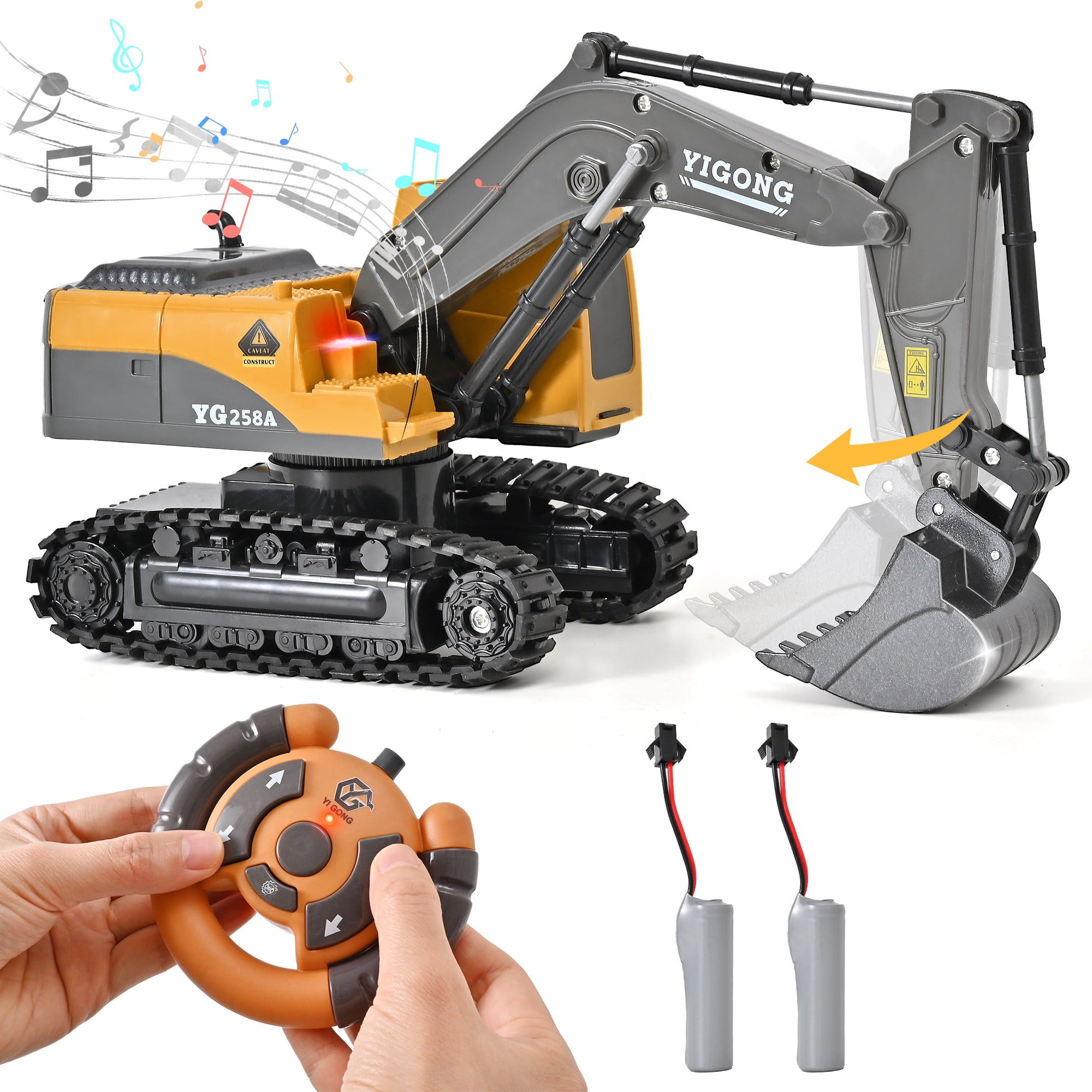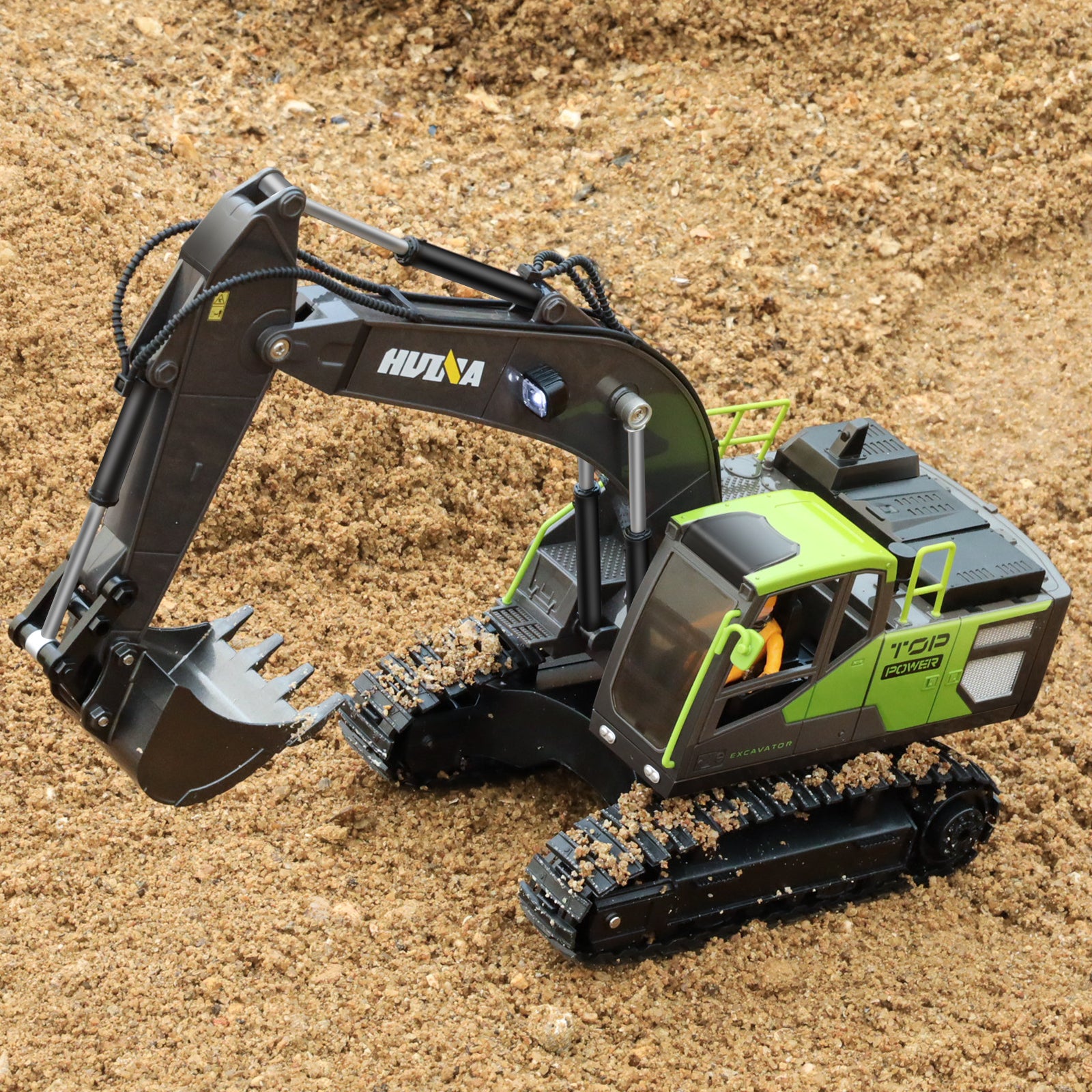What Makes the rc excavator Stand Out Among Other Construction Machines
Wiki Article
Understanding How Excavator Functions and Its Influence on Performance
Excavators play an important function in building and construction and mining procedures, relying on a complex interplay of mechanical and hydraulic systems. Their ability to do a selection of tasks hinges on both their layout and the modern technology incorporated within. Comprehending these elements can significantly impact operational effectiveness and performance. As developments remain to reshape the market, one need to think about just how these changes will influence future practices and efficiency.The Fundamentals of Excavator Mechanics

The Function of Hydraulic Equipments in Excavators
At the heart of excavator procedure exists the hydraulic system, which plays a pivotal role in powering the maker's activities and features. This system utilizes pressurized hydraulic fluid to transfer energy, enabling various actions such as moving, training, and excavating. By taking advantage of the concepts of hydraulics, excavators can do jobs with exceptional accuracy and force, improving overall operational efficiency.The hydraulic system includes key components, including cylinders, valves, and pumps, which function with each other to manage the flow and direction of the liquid. When the driver involves the controls, the hydraulic fluid is guided to particular cylinders, converting the driver's commands right into physical movement. This mechanism permits smooth and receptive actions, which are important in construction and excavation environments. double e volvo rc excavator. The performance of the hydraulic system straight affects the productivity and versatility of the excavator, making it an indispensable component in modern-day excavation proceduresTrick Elements of an Excavator
Comprehending the key components of an excavator is necessary for comprehending how this effective device operates. An excavator is composed of a number of significant components, including the undercarriage, house, boom, container, and arm. The undercarriage gives stability and mobility, typically including wheels or tracks to navigate numerous surfaces. Your house consists of the engine and hydraulic systems, enabling the driver to regulate activity and power the equipment. The boom prolongs from the house, enabling vertical reach, while the arm attaches to the bucket, assisting in excavating and training operations.Additionally, the taxi houses the operator, geared up with controls for specific maneuvering. Each of these elements plays an important function in the excavator's total functionality, adding to its effectiveness and performance on construction sites. Recognizing these components helps in preserving and maximizing excavator performance, making sure jobs are finished safely and efficiently.Accessory Convenience and Its Advantages
Attachment versatility is a necessary facet of excavators, enabling operators to switch between various tools tailored for particular tasks. This versatility not just improves task performance yet additionally adds to cost-effectiveness by reducing the need for multiple machines. Understanding the different types of attachments available can significantly impact the overall performance and functionality of an excavator on job sites.Kinds of Add-ons
While excavators are largely identified for their excavating capacities, their real adaptability hinges on the broad range of attachments available. These add-ons boost the excavator's capability, enabling it to do different tasks beyond excavation. Usual accessories include containers (for digging and scooping), hydraulic thumbs (for grasping products), and augers (for drilling holes) Grapples are made use of for taking care of and moving particles, while rippers can separate hard surface areas. Other specialized attachments, such as plates and plows, enable excavators to adjust to certain job needs. This diversity not only raises the maker's utility throughout different fields, consisting of construction, landscape design, and demolition, but additionally enables operators to customize their tools to meet certain project needs efficiently.Enhanced Task Effectiveness
Taking full advantage of task performance is a main advantage of using various excavator accessories. Various attachments permit an excavator to perform several jobs without needing to change tools, conserving important time and labor. Using a hydraulic hammer can damage concrete while a pail add-on can excavate soil, allowing a smooth operations. This versatility decreases downtime connected with tools changes and enhances performance on-site. In addition, specialized attachments improve precision in tasks such as grading or landscaping, causing greater top quality end results. The capacity to adjust to various job requirements not only improves operations however likewise reduces the requirement for extra equipment, making sure that jobs are finished quickly and successfully. Generally, accessory adaptability substantially adds to boosted task effectiveness in excavation work.Cost-Effectiveness and Flexibility
Cost-effectiveness is a significant advantage of making use of functional excavator add-ons. These add-ons enable a single excavator to perform multiple jobs, minimizing the requirement for extra machinery and labor - double e volvo rc excavator. By switching between pails, hammers, and grapples, drivers can deal with different jobs, from digging to demolition, thereby optimizing devices usage. This versatility not only lowers functional prices however likewise reduces downtime related to transforming tools. Furthermore, the capacity to personalize excavators with specialized attachments boosts performance, as they can effectively deal with varied jobs according to task needs. To end, the combination of cost-effectiveness and versatility in excavator attachments adds to enhanced operational efficiency and resource appropriation in building and construction and excavation jobs
Advanced Innovation in Modern Excavators
Modern excavators are progressively furnished with innovative modern technology that transforms excavation processes. Automation enhances operations, while enhanced gas efficiency minimizes functional expenses. In addition, wise control systems enhance precision and safety and security, marking a significant development in excavation devices.Automation in Excavation Processes
As excavation technology progresses, automation has arised as an essential element in enhancing effectiveness and precision on work sites. Modern excavators are outfitted with sophisticated automated systems that facilitate jobs such as grading, excavating, and trenching with very little driver intervention. These systems make use of sensors, GPS, and artificial intelligence formulas to guarantee exact positioning and deepness control, substantially lowering the margin for mistake. In addition, automation enables drivers to concentrate on tactical decision-making instead than hands-on controls, bring about boosted performance in general. Such developments not just streamline process yet additionally enhance safety by lessening human mistake in intricate operations. The integration of automation in excavation processes stands for a substantial advancement in building modern technology, driving the market in the direction of better performance and performance.Improved Gas Effectiveness
Improvements in modern technology have actually additionally resulted in considerable renovations in fuel efficiency for modern excavators. Modern devices are furnished with innovative engines that maximize power result while minimizing gas usage. These engines use ingenious combustion innovations, such as turbocharging and direct fuel injection, to boost efficiency and performance. Furthermore, lightweight materials in construction reduce overall weight, permitting for much less power expense during operation. The intro of variable rate controls allows operators to adjust engine efficiency according to certain tasks, even more minimizing gas usage. Consequently, these enhancements not just reduced operational costs yet additionally contribute to environmental sustainability by reducing exhausts. Generally, enhanced gas effectiveness in excavators is a necessary advancement that bolsters performance and economic viability in the building and construction market.Smart Control Systems
While drivers navigate significantly complicated job websites, smart control systems in excavators have actually emerged as essential devices for enhancing performance and precision. These innovative innovations utilize sensing units and algorithms to keep an eye on various criteria such as load weight, surface problems, and operational efficiency. By automatically readjusting hydraulic functions, clever systems enhance equipment performance, leading to improved productivity and reduced wear on parts. In addition, operators benefit from user-friendly interfaces that supply real-time comments and diagnostics, enabling for educated decision-making. This integration of innovation not only improves procedures yet likewise reduces human mistake, adding to much safer workplace. As the building industry proceeds to progress, clever control systems will certainly play an essential duty in shaping the future of excavator efficiency and efficiency.Enhancing Operational Effectiveness With Excavators
Excavators play a crucial duty in boosting operational efficiency across different building and excavation tasks. Their convenience permits multiple tasks, including digging, material, and lifting handling, which improves process and decreases the requirement for extra devices. With powerful hydraulic systems, excavators can perform heavy-duty tasks with precision, considerably decreasing the moment called for to full tasks. The assimilation of innovative technology, such as GPS and automated controls, further optimizes their procedure, making it possible for drivers to accomplish greater accuracy and lower product waste. Furthermore, contemporary excavators are designed to eat much less fuel and minimize emissions, adding to both expense savings and environmental sustainability. rc excavator By making use of excavators properly, building teams can enhance performance, satisfy project deadlines, and boost general site monitoring. This multifunctionality and effectiveness make excavators essential devices in the contemporary building landscape.The Future of Excavators in Building and Mining Industries
As the building and mining sectors progress, the future of excavators is poised for substantial change driven by technical advancement and changing functional demands. Developments in automation and expert system are reshaping excavator capacities, enabling boosted precision and effectiveness in procedures. Self-governing excavators are arising, decreasing the demand for human intervention and lessening the risk of accidents.Moreover, the combination of telematics and IoT modern technology allows real-time surveillance of machine efficiency and predictive maintenance, enhancing uptime. Environmentally friendly layouts, including electric and hybrid models, are getting grip, aligning with sustainability goals within the industry.Additionally, the usage of advanced products and lighter layouts enhances fuel efficiency while maintaining efficiency requirements. As these patterns progress, excavators will certainly play an essential duty in fulfilling the boosting needs for productivity and safety and security in construction and mining, inevitably transforming operational landscapes.Frequently Asked Questions
How Do Climate Condition Impact Excavator Efficiency?

Weather considerably influence excavator performance, as rain and mud can prevent grip and stability, while extreme temperature levels might impact hydraulic systems. Operators should adapt to these variables to assure suitable performance and security during procedures.
What Security Steps Should Operators Follow While Making Use Of Excavators?
Precaution for excavator drivers include wearing ideal personal protective tools, carrying out pre-operation inspections, making certain appropriate communication with ground employees, maintaining a secure distance from overhead dangers, and adhering to well-known operational methods to stop accidents.Just How Typically Should Excavators Be Kept for Ideal Performance?
Excavators need to be maintained consistently to ensure peak efficiency, generally every 250 operating hours or as defined by the manufacturer. Regular checks enhance dependability, prevent unforeseen failures, and extend the life-span of the equipment.
What Is the Typical Life-span of an Excavator?
The ordinary lifespan of an excavator normally ranges from 10,000 to 15,000 hours of operation. Variables influencing durability consist of maintenance methods, running problems, and the quality of the maker itself, impacting general performance and efficiency.
Can Excavators Run on Uneven Surface Efficiently?
Excavators can run efficiently on irregular terrain as a result of their articulated styles and adjustable tracks. These attributes allow them to preserve stability and grip, enabling effective procedure in difficult settings frequently encountered in building and landscape design jobs. Each of these parts plays an important function in the excavator's total functionality, adding to its performance and effectiveness on building websites. Maximizing work efficiency is a primary advantage of using numerous excavator attachments. While operators navigate progressively complicated work websites, clever control systems in excavators have emerged as important devices for improving performance and accuracy. Excavators play an essential role in enhancing operational efficiency across various building and excavation jobs. Developments in automation and man-made knowledge are improving excavator abilities, enabling for improved accuracy and effectiveness in procedures.Report this wiki page